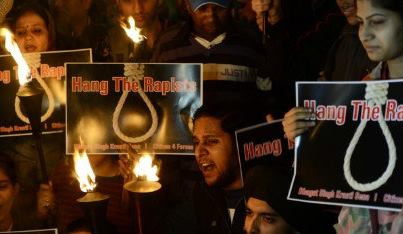
New Delhi, Jan 3: The family of the 23-year-old girl who died after being brutally raped in Delhi last month has no objection to her name being made public if the government decides to name a more stringent law after her, the victim's father has said. "I have no objection if the new anti-rape law is named after her. That would be an honour...for that purpose the name can be made public. Otherwise, there is no point," the victim's father told ET on Wednesday.
Besides giving his conditional assent, the father said that the lone juvenile among the six accused should not be let off lightly because of his age. "The juvenile should be punished first...he was the one who lured my daughter into the bus and tortured her most mercilessly. He should be hanged like the other five accused," he said, speaking to ET from his native town Ballia in Uttar Pradesh.
This accused has furnished his school mark sheet as proof to establish that he is 17 years old, but the government has subjected him to a bone density test to verify his claim. Experts say that if he is proved to be a juvenile, he will get a maximum sentence of two-three years in a correctional home from a Juvenile Justice Board and he will also be entitled to bail.
"Imagine his brutality when he is 17...what a demon he would become once he is older? The government should reduce the juvenile age to 12 or 15 years," the father said, adding, "All the six accused should never be allowed to step out of the jail...they must be hanged. They are a threat to every woman on the street."
The police is likely to submit a charge sheet in court on Thursday.
The father's comments came a day after MoS Shashi Tharoor stirred a controversy by tweeting that the name and identity of the gang-rape victim should be revealed so that she can be publicly honoured by having the revised law named after her. Tharoor's proposal appears to have put the government in a quandary. A senior home ministry official, who did not wish to be named, said though the matter was yet to be examined, it was better if the victim's identity was not revealed. "We think the family should be allowed to live in peace and anonymity," the official said.
Another official pointed out that there was no precedent in India of naming a law after a person. "There is no provision in either the Indian Penal Code or the Criminal Procedure Code to name a law after a person. The girl has been a catalyst for the need to effect changes in the anti-rape law, but naming the law on her is not an option," the official said.
Ex-UP chief minister Mayawati and former IPS officer Kiran Bedi have, however, supported Tharoor's proposal.





Comments
Add new comment